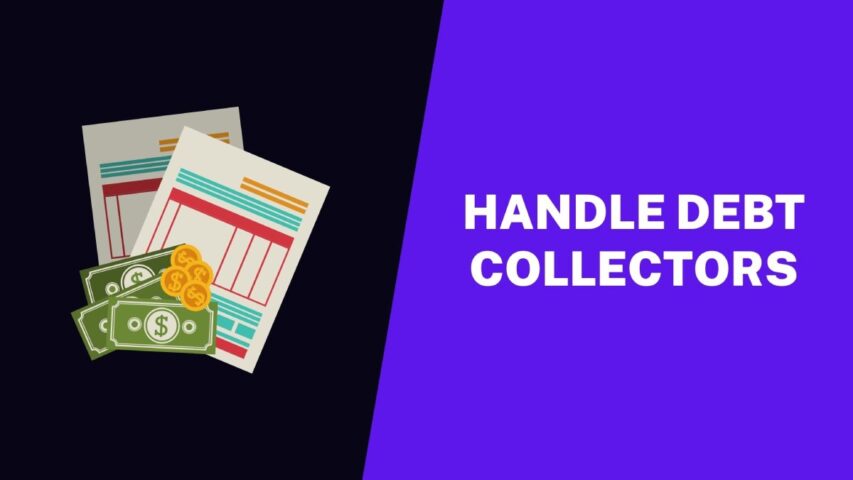It’s got to be every shopper’s worst fear. You find yourself in debt, and one evening, an unknowing debt collector visits you, demanding payment of the money you owe or facing the consequences.
The best advice anyone can give is to solve your debt problems before they become so serious that the debt is sold to a debt collector. Then, make repayment arrangements, keep track of your finances, and work out a deal with your creditors.
It’s crucial not to panic if this isn’t achievable or if the debt collector has already been summoned. Yes, the problem is severe and will require your attention, but there are ways to cope with the debt collector if you have the correct information.
Avoid burying your head in the sand
First and foremost. Don’t panic, but don’t hide your head in the sand either. This may appear to be a paradox at first, but you must understand your circumstance to deal with it calmly before things go out of hand. Ignoring the bill collector is not a good idea.
Obtain written information
When a debt collector appears at your home, they may seem very frightening, and these frightening tactics are frequently used to get their money faster. Instead, when a collector first informs you of your debt, you should answer the door, keep your conversation brief, and request that the information be sent to you in writing. They must then send you a formal confirmation within five days, as required by law. This will allow you to evaluate your condition on paper rather than under the collector’s watchful eye.
You should be able to see how much money you owe based on the debt information. You should double-check that the debt is yours, that the calculations are correct, and that you owe the amount reported. If you believe a mistake has been made, you have 30 days to file a letter to the debt collector to challenge the charge. If you dispute the debt, they must prove it before they can proceed with the collection process.
Invoices are an important part of keeping track of your company’s accounts and financial records. They keep track of your revenue, cash owing to you by clients, and bad debts written-off in the sad event that a client does not pay you. You may create invoices directly from your browser using a free invoice generator.
Recognize Your Rights
If the debt is correct, you still have rights, and the same rules bind debt collectors. They can’t collect before 8 a.m. or after 9 p.m., they can’t come to your place of business if you don’t want them to, and they can’t make threats unless they have the intent and legal documents to back them up. Keep a note of any misbehavior that occurs, as it may come back to haunt you in court.
Make a Deal With Them
Many people have never considered what a debt collector’s job entails. Their job is to endeavor to collect the debt as soon as feasible. This frequently leads to them employing fear tactics in an attempt to persuade you to pay up, but the truth is that if you can’t afford it, they won’t get very far. Many of them will agree to a negotiation procedure.
You should try to work out a repayment plan with them and negotiate a down payment if possible.
Debt collectors bought your debt from the original lender for pennies on the dollar. As a result, there’s a good chance they’ll agree to accept a partial payment of what you owe, perhaps as little as half.
Keep a record of everything
You should keep track of everything that transpires with the debt collector, as this will make it much easier to prove anything if they try to deceive you. This includes payback schedules, all letters sent and received, transactions, and even phone calls and discussions if you can record them.
Never Give Your Bank Account To Them
When you’re working out a payment plan with the collector, it’s best not to give them access to your bank account so they can set up an auto-draft for a monthly payment. There’s no guarantee that they won’t take a higher sum if it becomes available or that you won’t be stuck in your overdraft with further fees to pay. Consider paying using recorded money orders or third-party payments instead.
Management of Debt
Debt management options are available to assist you in regaining control of your debt, whether you’re dealing with a debt collector or not. In the case of major debt problems, proper financial management and budgeting can help you make on-time payments, and formal debt solutions can be used to avoid debt collection.
Professional assistance is available if you are threatened by a debt collector and are unsure of the best course of action. An attorney can assist you with the legal issues of debt collection, and debt negotiation firms such as Debt Negotiators can provide unbiased financial advice to help you better understand and negotiate your position.
If you’re looking for a way to make more money, it’s time to pick up some high-income skills. For example, Debt collectors must follow specific rules to collect on past debts, so it’s critical to understand your rights in this circumstance. Don’t ignore debt collectors; get as much information as you can and have it written down. To prevent falling for debt collection scams or resetting the clock on past debts, don’t give personal information over the phone.


